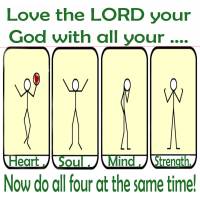

Read: Mark 12:30-31 NIV |
Jesus memorized the Shema as a boy, according to Jewish customs. The Shema is the central prayer in the Jewish prayer-book [Hebrew for Christians]. The first part of the prayer begins with Deuteronomy 6:4-9. As a practicing Jew, Jesus would have recited the Shema at least twice daily – every morning and every evening at the beginning of His prayers.
The first two verses of the Shema (verses 4-5) link to our key scripture of study: “Hear, O Israel: The LORD our God, the LORD is one. You shall love the LORD your God with all your heart and with all your soul and with all your might.” (Deuteronomy 6:4-5).
With the beginning of the Shema ever-present on His mind, Jesus chose to remind the scribes of the very prayer they prayed daily as the greatest commandment. This week, let us take a closer look at loving God with all our strength.
“Strength” is not just having a strong body, exhibiting power or determination. It also includes the ability and the might to pull “all” of our heart, soul and mind together towards a response to God’s love. Giving all of our heart, soul and mind are inward commitments that exhibit themselves externally through our actions and strength. We love and serve God from the inside out.
Jesus practiced what He preached and taught. He put all of His strength into everything He did for His Heavenly Father. Each day we have the opportunity to use our ears, eyes, hands, feet, body and voice for His sake.
We use our ears by attuning them to the voice of God as He whispers into our hearts and minds. As we listen, we use His Word to filter out worldly influences. By applying our spiritual hearing, we can learn God’s quiet voice. Listen, then hear, then act on His commands.
We use our eyes by affixing them on the prize of our calling. Our eyes are the portal to our hearts, mind and soul. Our eyes direct our bodies in the direction we should go. By maintaining a focus on things eternal, we can give our all to Him by studying His Word, following His example and seeing what He sees,
We use our hands by allowing using them to carry out God’s work as He directs. Our hands should be quick to lend a hand, but resist shoplifting from God. We shoplift from God by trying to claim every blessing that comes into our lives for ourselves. Remember we are the hands of God on this world.
We use our feet by advancing towards the will of God and turning away from sin. The Great Commission (Matthew 28:19) calls for us to “Go”. Stand ready to follow where God says to go, because to stand still and not move is disobedience.
We use our body by accepting and consecrating it for His purpose. Taking care of this earthly vessel is important in carrying out God’s will. Our body is a temple of the Holy Spirit (I Corinthians 6:19-20). Therefore, how we behave, think and speak, and what we let into the temple through our eyes and ears becomes critically important as well, for every thought, word and deed is in His view.
We use our voice by acknowledging Him to others. Too many believers are silent, when we should speak up. Conversely, we speak when we should seek to understand. Strive to find the right balance by prayerfully asking God for guidance. Your comment or testimony may be the seed that sprouts the next great preacher, or it could prevent the next great injustice.
We love God with all our strength by choosing to live daily life as a dependent and grateful “receiver” of God’s grace – and as a cheerful and consistent “giver” of what He gives to us.
Jesus based this first greatest commandment, on the Shema. In so doing, Jesus emphasized that, He that is “ALL” wants us to love Him with our “all. Give your “all” to Him today!
Questions:
1.Discover – The Shema includes three key scriptures:
Deuteronomy 6:4-9;
Deuteronomy 11:13-21
Numbers 15:37-41
A. What is the key theme of each Scripture?
B. How can we apply this prayer to our lives?
2.Develop – What are my personal areas of strength?
A. Which of my strengths can I use to the glory of God that I am not already using?
B. Ask your prayer partner what other strengths they see in you? Do you use them only for your glory or His?
3.Demonstrate – Understanding that “all” means just what it says:
A. What prevents believers from giving their “all”?
B. What personal goals can you set to be more of a “giver” and avoid shoplifting everything God places in your life for yourself?
